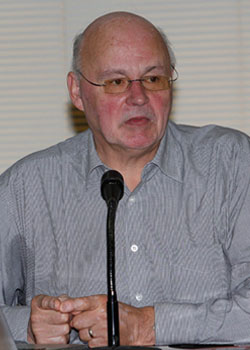Project Description
Professor Emeritus at the Catholic University of Louvain and the UNESCO Chair in Education Sciences, which he created in 1994 and has been the first holder. He received several distinctions including a UNESCO distinction in 2002 for the quality of this Chair, a distinction awarded in 2004 by the World Cultural Council (Special Recognition Diploma for Educational Work of Great Talent), then as Doctor Honoris Causa of the Cheikh Anta Diop University of Dakar in 2011 and a second title of Doctor Honoris Causa of the Catholic Institute of Paris in 2013, where he continues to supervise PhD. theses and work as a part-time teacher. He held numerous positions, including President of international associations such as the Association for the Development of Methodologies for Evaluation in Education (ADMEE) and the International Association of University Pedagogy (AIPU). He has carried out numerous missions for international NGOs (WB, EC, UNESCO, and UNICEF). He continues to manage three collections of scientific books at Editions De Boeck-University. As an international expert, he has been a member of the French Program Commission, the High School Evaluation Board, and the School’s Future Commission and he is still working as a “scientific pilot” at CNESCO in the Bac-3 / Bac +3 project on orientation. His work focuses on the methodologies of observation and evaluation at the macro, meso and micro levels, skills-based approaches, pedagogy of higher education, a new vision of educational sciences (in collaboration with the Dakar Academy of Sciences ). He is the author of several hundred scientific publications, including 32 books as author or co-author, 50 chapters in collective works, numerous articles as well as research or evaluation reports.
L’innovation : condition ou/et frein des réformes en éducation ?
Dans les discours, il est habituel de considérer l’innovation comme condition du dynamisme des réformes en éducation. L’observation pratiquée sur une dizaine de systèmes éducatifs différents et l’examen de la littérature scientifique internationale me montrent qu’il faut nuancer ce propos. Dans une première partie de notre exposé, nous dégagerons donc les conditions pour que l’innovation (ce concept ayant été explicité pour rappel) joue effectivement ce rôle et les obstacles qui s’y opposent. Dans un second temps, nous nous pencherons sur les différentes formes de pilotage (et donc d’évaluation) rencontrées dans différents pays au niveau macro, méso et micro et en quoi celles-ci catalysent ou handicapent le dynamisme des réformes éducatives projetées.
Mots clés : Innovation, Réforme éducative, Condition, Frein.

